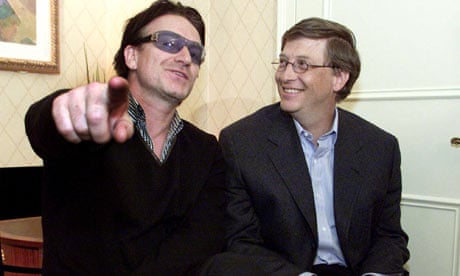I admire Bono's passion for righting wrong and the commitment he's made to making life better for the billions on Earth who were born in wretched circumstances. But I wish he could be less of a scold – I liked him most when he was simply a brilliant bandleader. Still, there's no denying his effectiveness in getting attention for his causes.
The luminaries who flock each year to the TED conference, where selected speakers add another 15 minutes of fame to their typically glittering résumés, were dazzled on Tuesday by Bono's latest pronouncement. He renounced (at least for the moment) his status as a rock star in order to become a "factivist" – an "evidence-based activist" in pursuit of an end to global poverty. (In what was undoubtedly the most retweeted reaction, Bill Gates, apparently from a front row seat, proclaimed:
Bono asks us all to become "factivists" at TED.I'm in!#ted2013 twitter.com/BillGates/stat…
— Bill Gates (@BillGates) February 26, 2013
– as if his own foundation's prodigious spending hadn't already been devoted to an assortment of worthy causes.)
One of the most useful results of Bono's ode to factivism could be his use of the term. I'd like to see evidence-based everything, whether science, journalism, politics – you name it. Science is, for the most part, based on evidence, even if other interests twist the data to demonstrate falsehoods, or create uncertainty where the evidence overwhelmingly points to a conclusion.
But we live in a world where evidence, which can conflict with the imperatives of the rich and powerful, doesn't always impel those influential people to change their ways. Rather, they often deny reality in order to thwart change. The most blatant example today is mega-funding for climate change "skeptics", mostly financed by wealthy people too cowardly to admit publicly what they're doing, of climate change "skeptics" who want to confuse the public on an issue that is essentially settled science.
Denying scientific reality goes beyond financial interests, of course. Creationists call evolution bunk, and in America, at least, they never quit trying to force schools to teach creationism as fact, or at least a theory as plausible as evolution. A recent American president added to his discredit by muddling the issue, and survey after survey shows that a stunningly large number of Americans believe that the Bible represents the literal truth.
The political sphere has never been notable for its belief in reality. This is a bipartisan affair, though in recent years the most ardent liars and spinners have been Republicans. If Obama says it's raining, you can count on Republicans to point out that it's actually quite dry, so long as you avoid the raindrops – or, just as likely, deny outright that the weather is anything but sunny.
Liars and those who would twist the truth have armies of opinion launderers on their side: think tanks that take positions not-so-amazingly congruent with their funders' ideas, PR agencies, lobbyists and so many others. It often seems as though the obfuscators have more money on their side than the reality-based folks, because they keep getting attention.
An antidote for this constant spin should be journalism. But as the traditional American press descends further toward sensation and stenography – the latter, by most the way, looks like predominant mode in Washington DC – this may be a forlorn hope. The rise of fact-checking as an overt subgenre of journalism raises an obvious question: why do journalists permit their sources to dissemble with such impunity in the first place?
Yet even if journalists collectively decided to do their jobs one day, even that might not be enough. Dismaying research has shown that people who want to believe lies become more determined to believe them when someone points out the falsehoods. David McRaney calls it the "Backfire Effect" – and several studies have demonstrated how corrosive it can be to the notion that we should base decisions on reality. It's part of the depressingly persuasive "Science of Why We Don't Believe Science", as Mother Jones put it.
In my most recent book I made the case that we can't rely on anyone but ourselves, and when it comes to being factivists, in Bono's sense, then it's essential for us to be active media users rather than passive consumers. It's never been more important.
But we still need the journalists to do their jobs, and to do the math instead of going with their guts, as I said late last year as part of a 2013 journalism predictions series. This might actually be good for the trade, not just audiences.
Admitting that this was more a hope than a prediction, I said:
"The rise of evidence-based journalism will be a breath of fresh air, especially in politics, and will be good for media organizations' bottom lines, too. As the volume of information rises, the value of any individual piece of information becomes more and more questionable, and the journalists who do the math will have more credibility. When enough news consumers are hopelessly confused – or have been burned by low-quality information – they'll retreat to quality."
